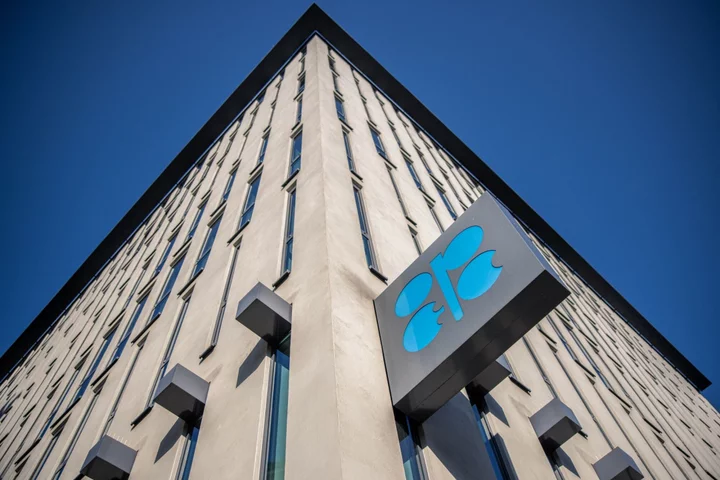OPEC+ gathered in Vienna to decide whether to give their existing production cuts more time to take effect, or take further preemptive action to boost prices.
A cut is among the options being discussed, according to one delegate, though ministers arriving in the Austrian capital gave little indication as to which path they would choose. The group’s decision was further complicated by the fact that oil prices rose for a second day amid greater economic optimism, a reversal of the trend seen in late May.
“The main objective of OPEC and its allies is to preserve the stability of the oil market and avoid any volatility,” Hayyan Abdul Ghani, Iraq’s minister of oil and deputy prime minister for energy affairs, told reporters in Vienna on Friday. “We will not hesitate to take any decision that would bring more balance and stability.”
The Organization of Petroleum Exporting Countries and its allies are only a month into the surprise production cuts announced in April. Those new supply curbs of about 1.2 million barrels a day — on top of a 500,000 barrel-a-day reduction already announced by Russia — will run until the end of the year and it’s difficult to gauge their impact after just a few weeks, analysts at JPMorgan Chase & Co. said in a note.
The cuts “became visible in export data only in the second week of May,” according to the bank. “It will likely take several more weeks to ascertain their implementation and effectiveness.”
Oil traders gave little indication in recent weeks that they were willing to wait and see. They amassed short positions in crude futures, sending prices down by 11% in New York to about $68 a barrel at the end of May. Even with the recovery in the first two days of June, crude was about 14% below its April peak.
“The promise of future bullish supply tightening has not convinced the market of rising oil prices,” according to JPMorgan.
When asked about this bearish trend last week, Saudi Energy Minister Prince Abdulaziz bin Salman, who has sought to hurt short sellers with previous rounds of cuts, told speculators to “watch out.”
Despite this warning, many observers were expecting OPEC+ to hold steady at this weekend’s meeting, particularly after Russia’s Deputy Prime Minister Alexander Novak told Izvestia that the group was unlikely to take “any new steps.” He later moderated that statement, saying the group could decide to take any action that’s necessary.
The run-up to the meeting was overshadowed by that difference of views from the two largest members, as well as by a decision to bar journalists from Bloomberg, Reuters and the Wall Street Journal from attending the gathering in Vienna. OPEC ministers hold their meeting on Saturday, followed by a full OPEC+ conference on Sunday.
The group’s existing cuts should be sufficient to tighten oil markets in the second half of the year assuming there’s no recession, but to push prices higher “the alliance — or at least some members — would likely need to cut more,” JPMorgan said. A further reduction of about 500,000 barrels a day by Saudi Arabia would bring the kingdom’s output into line with Russia, it said.
(adds detail in second paragraph)
Author: Nayla Razzouk, Grant Smith, Ben Bartenstein and Fiona MacDonald

